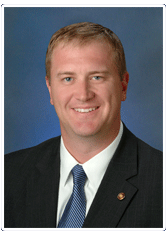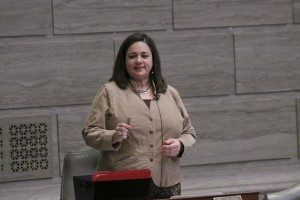JEFFERSON CITY, Mo. — Sen. Eric Schmitt, R-St. Louis, started filing tax cut bills when he was elected to the Senate in 2008, it was part of the reason he ran for office in the first place.
“I think it’s been 100 years since it’s been below 6 percent, since an individual has had a chance to keep their own money,” he said. “At the end of the day these are hard to do.”
What’s changed this year is that there is a sense of urgency now. Schmitt has three tax bills that he’s sponsored – SB 496, 497, and 666. Part of the motivation for those pieces of legislation is that surrounding states, particularly Kansas and Oklahoma, have lowered taxes in recent years and are drawing Missouri residents and businesses to relocate, Schmitt says.

“I think we’re losing employment; I think we’re losing wealth. Missouri is 47th in GDP growth,” Schmitt said. “You can save 6 to 7 percent by moving to Kansas.”
Sen. Paul LeVota, D-Independence, serves on the Ways and Means Committee where SB 496 and 497 were read. He said this particular concern is unfounded.
“We’re not losing jobs to Kansas,” LeVota said. “They had a 1.5 percent growth from last year. We had a 2.2 percent growth.”
The first bill, SB 496, was combined with Sen. Will Kraus’ bill, SB 509. The bill gradually — one tenth of a percent for every $100 million in additional revenue for the state — reduces business income taxes. The difference in revenue from 2014 and 2015 was about $1 billion. The cut stops at a 1 percent difference moving the percentage down to 5 percent; Schmitt originally asked for the cuts to continue to 4 percent. The fiscal note for SB 509 predicts a loss of income taxes worth about $163 million in 2016 and up to $268 million in 2017.

Minority Floor leader Sen. Jolie Justus, D-Kansas City serves on the committee Schmitt chairs — Jobs, Economic Development, and Local Development.
“It is irresponsible to talk about cutting taxes when we currently need to fund education and basic services in this state,” Justus said. “Missouri is a low tax state already.”
SB 497 adjusts the maximum tax rate table for individual income taxes, capping the maximum percentage someone could be taxed to 5.5 percent by 2015. The introduced fiscal note predicts a loss of $383 million in income taxes in 2016.
LeVota said the loss of revenue, were both bills to be passed, may be closer to $1.5 billion. That figure happens to be the exact number predicted to be gained from passing Medicaid expansion, LeVota said.
SB 666 creates an income tax credit for property owners of 0.75 percent of the assessed value.
“We have a $400 million surplus,” Schmitt said. “For us to return that to the tax payers, that’s the smart thing to do.”
Schmitt said additional revenue from property taxes and sales tax purchases he predicts would make up for the lost revenue from income taxes.
“We ought to be concerned with how individuals will prosper,” Schimdt said. “Historically when this has been done it has led to economic expansion that’s what happened in Oklahoma.”
LeVota also has a tax credit bill, SB 687, which he says applies to 80 percent of Missourians, but on a sliding scale with those on the lower end of the income spectrum receiving more money back.
“That’s the type of cut that stimulates the economy,” LeVota said.
Schmitt is also concerned with economic development. He has sponsored a bill, SB 742, creating the Missouri Export Incentive Act. The bill creates tax credits for businesses freighters working out of Missouri airports. Schmitt looked at his home airport, Lambert International, which lost it’s passenger hub when TWA folded, as in need of improvement.
He compared it to O’Hare International Airport in Chicago, one of the most bustling airports in the World.
“There are more jobs around O’Hare than in downtown Chicago,” he said.
He is hoping the act will encourage businesses to create manufacturing and other middle class jobs in Missouri.
“We already have economic development tools we need to attract businesses,” Justus said.
SB 666 has already been voted out of the Jobs, Economic Development, and Local Development Committee. The other two tax bills have had a two readings in the Ways and Means Committee, chaired by tax-cut-friendly Kraus. The bills are likely to leave committee largely unscathed. SB 742 had its first reading on the floor.
“(For the tax bills) I think we’ll have a broad majority in the Senate and the House,” Schmitt said. “I would love for the Governor to sign it, but we might have to attempt a veto override.”



